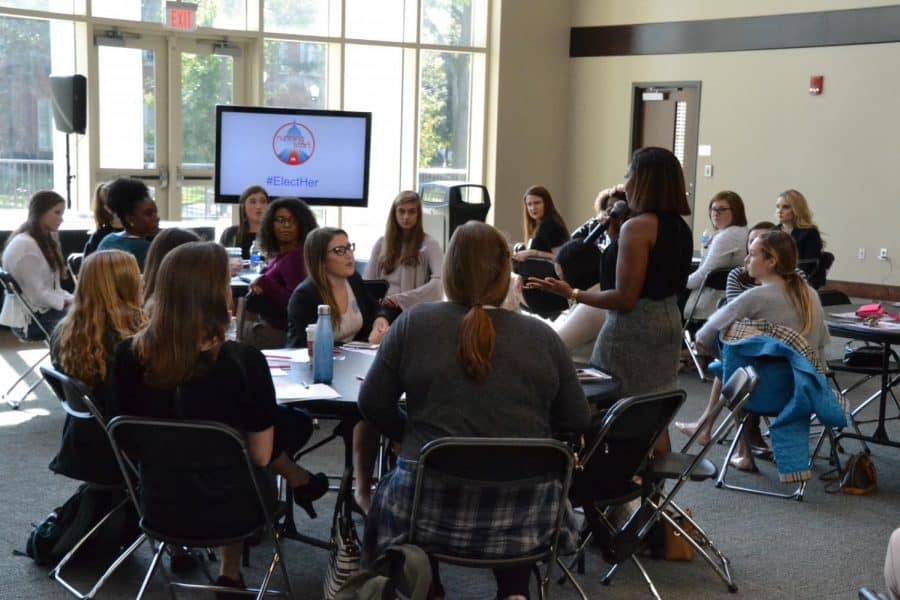Ready to Run prepares women to campaign
Last year, the Women and Gender Resource Center hosted Elect Her, a program replaced by this year’s Ready to Run Program. CW/ Emma Junck
November 5, 2018
For UA student Rolanda Turner, political awareness led her to change her plan for her life.
Before the 2016 Presidential Election, Turner was a pre-med student who had passed the MCAT, but after listening to conversation surrounding the election, she decided she wanted to change the dialogue she was hearing.
“I remember hearing remarks like, ‘Well, she’s a woman, so does she even have the capabilities of power in our democratic processes?’” Turner said. “To me that was just mind blowing, that we were in 2016 and still questioning whether sex has the power, ability or effectiveness to influence a decision. That was really the driving force that led me to change my major.”
Turner is now a junior majoring in political science and psychology. After becoming an ambassador for the Women and Gender Resource Center (WGRC), she decided she wanted to do research about diversity and leadership. In cooperation with the Elle Shaaban-Magana, the director of the WGRC, and its Intentionally Diversifying Engagement and Leadership (IDEAL) series, Turner is conducting a study entitled “Making Her Own Way.”
The study is about political ambition among millennial women, ages 19 through 38, who are interested in running for an elected office or who have previously run for an elected office.
“The study is important because it will contribute to the fields of gender studies, higher education and political science and seeks an understanding of how gender and age can influence millennial women’s political ambition and engagement,” Turner said.
Research is currently being conducted through interviews with 20 women within a two-hour distance of Tuscaloosa. Turner said the interviews focus on the struggles, experiences and adversities the women have faced during the time they have been politically engaged.
“Some research has shown that millennials were disengaged, but we’re finding more examples of women who are the opposite, that are very passionate about their communities and they are doing what they can to get ready to run,” said Jaclyn Northrup, assistant director of the WGRC.
In addition to her work with the study, Turner is planning to speak at Ready to Run, a training program geared toward assisting women interested in running for elected office. The program will be held in 205 Gorgas Library from 5:30-8:30 p.m. on Wednesday, Nov. 14.
The main goal of the program is to give individuals an idea about what it’s going to be like to run for office and things they should consider before running, such as which office they want to pursue, how to develop a campaign staff, how to launch a campaign, how to navigate party systems and how to reach voters.
The program originated at Rutgers University after students noticed a lack of women in the student legislature and wanted change. Today, the program is nationwide with programs held in 20 states.
“I got involved with [Ready to Run] because when I first began working, there weren’t many women running for political office in the state of Alabama or nationally,” said Pat Vandermeer, chair of the Ready to Run Program for Alabama. “I really just began to see that we needed a seat at the table. There’s a great picture of a Senate committee talking about women’s health care, but there are no women in the picture. That really caused a lot of people to consider what’s wrong with our system.”
While the program is mainly directed toward women, everyone is welcome to come.
“I think the same overview that’s helpful to women would be helpful to men or nonbinary people,” Northrup said. “It starts with specifics about why it’s important for women to run because we’re underrepresented in basically all levels of government, but a lot of aspects about campaigning would still be relevant.”
Turner said the program recognizes the problem with the political system and seeks to find a solution to bridge the gap in politics.
“On average, it could potentially take a woman seven years from someone saying you need to run before they actually do it, compared to a man who just does it,” Turner said. “We are holding ourselves seven years back. I definitely think it’s important for women to understand that there’s limitations in our field, but we can break those barriers.”
Editor’s note: Arielle Lipan, The Crimson White’s managing editor, is on the planning committee for ‘Ready to Run.’ She did not contribute to the reporting of this story.








